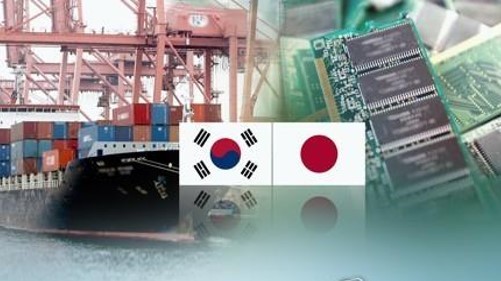Japanese firms in Korea see sales plunge since export curbs
By Shin Ji-hyePublished : July 5, 2020 - 16:06

Major Japanese firms doing business here have seen sales plunge as Japan’s export restrictions on Korea led to a boycott of products, the latest data showed Sunday.
Local corporate tracker CEOScore compared the business performance of 31 Japanese consumer goods companies here before and after Japan imposed export curbs on Korea in July last year. The comparison found that average revenue fell 6.9 percent and operating profit plunged 71.3 percent last year compared to a year earlier.
The food and beverage sector marked the biggest decline, seeing sales drop by 19.5 percent on-year last year. Both the food and beverage sector’s operating profits and net profits turned to losses.
Lotte Asahi Liquor, the local distributor of Japan’s leading beer brand Asahi, saw its sales cut in half in Korea during the period. Its sales dropped 50.1 percent, or 62.4 billion won ($52 million), last year, and suffered an operating loss of 30.8 billion won.
Sales of Japanese food company Ajinomoto, known for instant soup Vono, also fell 34.2 percent, or 10.9 billion won.
Alongside food and beverage, revenues of automobiles and auto parts, clothing and household goods shrank more than 10 percent from a year ago.
FRL Korea, which operates Japanese casual clothing brand Uniqlo here, saw its revenue drop by more than 30 percent.
Sales of Japanese clothing brand Descent Korea and detergent brand Lion Korea declined 15.3 percent and 12.9 percent, respectively. Household goods brand Muji also saw its sales drop by 9.8 percent.
Revenue at convenience store Ministop Korea fell 3.1 percent. Ministop Korea is 96.06 percent owned by Japan’s Ministop and 3.94 percent by Mitsubishi, which has been labeled here as a “war crime company.”
Japanese automaker Honda Korea’s sales fell 22.3 percent, or 104.1 billion won, to 14.6 billion won in net losses last year.
Meanwhile, Korea’s materials, parts and equipment sectors were also not free from trade restrictions.
Since Japan tightened export controls of three major high-tech raw materials -- hydrogen fluoride, fluorinated polyimides and photoresists -- in July last year, Korean companies have suffered greater damage than their Japanese counterparts.
According to CEOScore’s comparison on companies affected by the export curbs, sales of eight Korean companies fell 6.4 percent while revenues of eight Japanese companies rose 4.6 percent during the July-December period last year from a year earlier.
Profitability deteriorated for both Korean and Japanese companies in the materials, parts and equipment industries.
During the period, eight Korean firms saw their operating profits and net profits fall 34.3 percent and 42.9 percent, respectively, year-on-year. Eight Japanese companies saw their operating profits drop 14.3 percent and net profits drop 15.8 percent.
By Shin Ji-hye (shinjh@heraldcorp.com)
Local corporate tracker CEOScore compared the business performance of 31 Japanese consumer goods companies here before and after Japan imposed export curbs on Korea in July last year. The comparison found that average revenue fell 6.9 percent and operating profit plunged 71.3 percent last year compared to a year earlier.
The food and beverage sector marked the biggest decline, seeing sales drop by 19.5 percent on-year last year. Both the food and beverage sector’s operating profits and net profits turned to losses.
Lotte Asahi Liquor, the local distributor of Japan’s leading beer brand Asahi, saw its sales cut in half in Korea during the period. Its sales dropped 50.1 percent, or 62.4 billion won ($52 million), last year, and suffered an operating loss of 30.8 billion won.
Sales of Japanese food company Ajinomoto, known for instant soup Vono, also fell 34.2 percent, or 10.9 billion won.
Alongside food and beverage, revenues of automobiles and auto parts, clothing and household goods shrank more than 10 percent from a year ago.
FRL Korea, which operates Japanese casual clothing brand Uniqlo here, saw its revenue drop by more than 30 percent.
Sales of Japanese clothing brand Descent Korea and detergent brand Lion Korea declined 15.3 percent and 12.9 percent, respectively. Household goods brand Muji also saw its sales drop by 9.8 percent.
Revenue at convenience store Ministop Korea fell 3.1 percent. Ministop Korea is 96.06 percent owned by Japan’s Ministop and 3.94 percent by Mitsubishi, which has been labeled here as a “war crime company.”
Japanese automaker Honda Korea’s sales fell 22.3 percent, or 104.1 billion won, to 14.6 billion won in net losses last year.
Meanwhile, Korea’s materials, parts and equipment sectors were also not free from trade restrictions.
Since Japan tightened export controls of three major high-tech raw materials -- hydrogen fluoride, fluorinated polyimides and photoresists -- in July last year, Korean companies have suffered greater damage than their Japanese counterparts.
According to CEOScore’s comparison on companies affected by the export curbs, sales of eight Korean companies fell 6.4 percent while revenues of eight Japanese companies rose 4.6 percent during the July-December period last year from a year earlier.
Profitability deteriorated for both Korean and Japanese companies in the materials, parts and equipment industries.
During the period, eight Korean firms saw their operating profits and net profits fall 34.3 percent and 42.9 percent, respectively, year-on-year. Eight Japanese companies saw their operating profits drop 14.3 percent and net profits drop 15.8 percent.
By Shin Ji-hye (shinjh@heraldcorp.com)




![[Herald Interview] 'Amid aging population, Korea to invite more young professionals from overseas'](http://res.heraldm.com/phpwas/restmb_idxmake.php?idx=644&simg=/content/image/2024/04/24/20240424050844_0.jpg&u=20240424200058)












![[KH Explains] Korean shipbuilding stocks rally: Real growth or bubble?](http://res.heraldm.com/phpwas/restmb_idxmake.php?idx=652&simg=/content/image/2024/04/25/20240425050656_0.jpg&u=)

